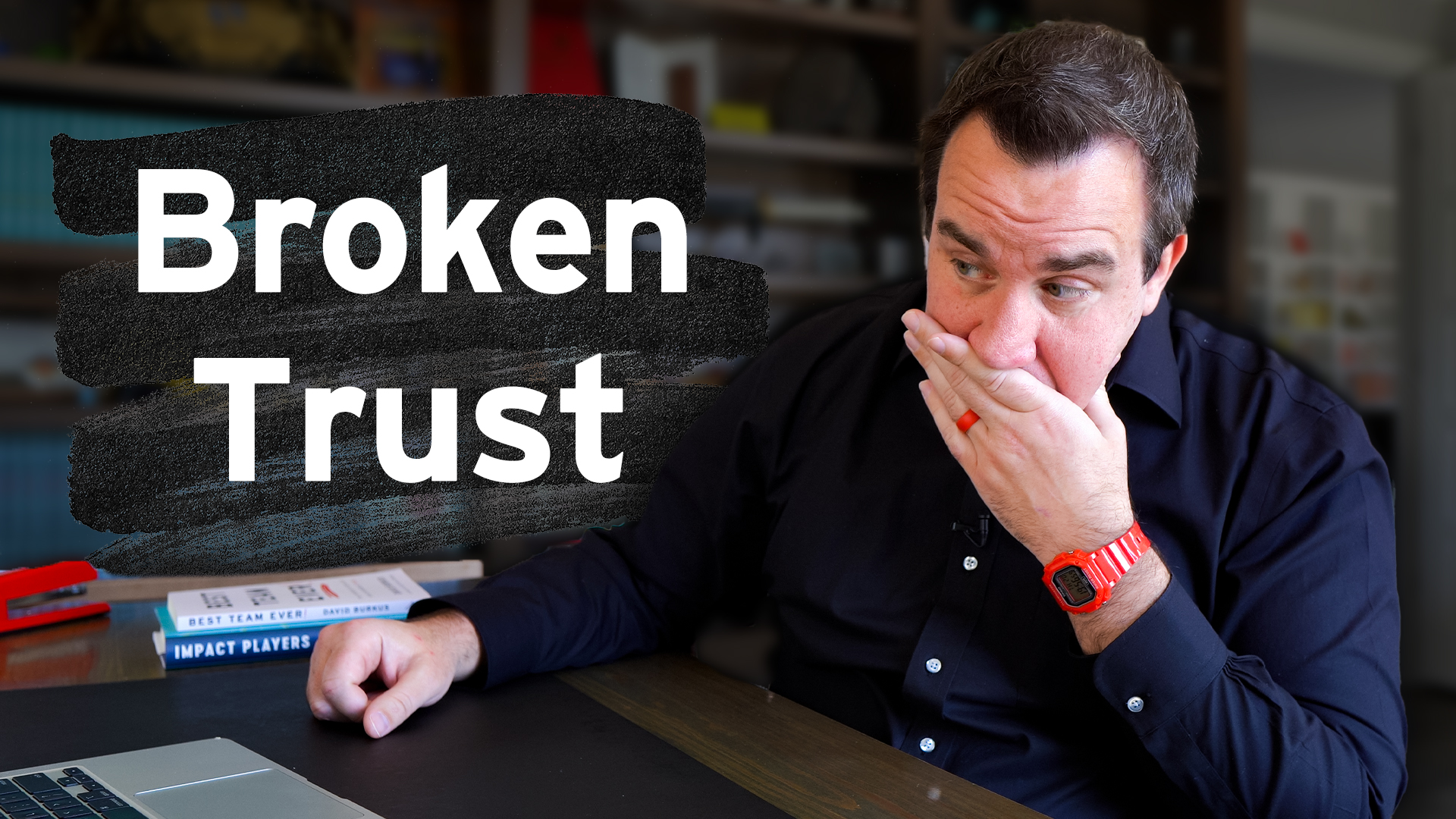
It happened. You thought you could trust them. But now, everything’s different.
Maybe you’ve been here before. Or maybe it just happened, and now you’re staring down a tough moment as a leader: someone on your team betrayed trust—not in a way that warrants HR or legal action, but still in a way that fractures the foundation of your working relationship.
They dropped the ball on a project. They fudged their progress. Maybe they had a meltdown in front of the team. Now everyone’s looking at you, silently asking, What are we going to do about this?
This moment is more important than it seems. Because how you respond—right now and moving forward—will determine whether that broken trust spreads or slowly starts to heal. And if you want to lead a healthy, high-performing team, trust me: you want to start the healing.
The Wrong Way To Respond To Betrayed Trust
Before we talk about the right way to move forward, let’s address the ways most leaders get it wrong.
Some go into damage control mode. They ignore what happened and hope it doesn’t come up again. Others overcorrect—coming down hard without really understanding what went wrong. Both reactions are understandable. Neither is effective.
Sweeping it under the rug doesn’t prevent it from festering. And cracking down too fast risks making the wrong kind of example—treating a stumble like sabotage and eroding trust even more in the process.
Trust, once broken, can’t be restored by force. It has to be rebuilt. And rebuilding starts with clarity.
Clarify The Violation
You can’t fix what you can’t define. So before you act, you need to clarify what kind of trust was violated.
Was it a competence issue? Did they drop the ball because they lacked the skill or bandwidth? That’s frustrating, sure—but it’s not malicious. It’s a development gap. And your response should center around support and growth.
Was it an integrity issue? Did they say one thing and do another? Did they hide their lack of progress and hope no one noticed? That’s a different conversation entirely. That’s about values, not skills.
Or was it a transparency issue? Maybe they didn’t lie or mess up the task. Maybe they just didn’t share something important. They withheld context. That kind of secrecy usually stems from a lack of psychological safety—they didn’t feel like they could be fully honest.
Each of these is a breach of trust. But each requires a different response. If you confuse a competence gap for an integrity breach, you risk losing a good employee. If you treat dishonesty like a coaching opportunity, the rest of the team will notice—and they’ll stop trusting you.
Decide If You’re Open to Repair
Once you’ve clarified what went wrong, ask yourself a harder question: Do you want to repair this?
You get to decide. Not every working relationship has to be restored. Forgiveness is not the same as reconciliation. You can forgive someone, and still decide that moving forward means moving in different directions.
But if you do want to rebuild—if you can realistically see yourself trusting this person again, given time and changed behavior—then it’s time to move into the hard but hopeful work of healing.
How to Rebuild Trust the Right Way
The first step in rebuilding is emotional honesty—with yourself.
Name what you’re feeling. Are you disappointed? Angry? Embarrassed? Acknowledge it, not publicly, but privately and honestly. You can’t lead through what you haven’t processed. If you bury that frustration, it will come out later—usually in unproductive ways. You’ll micromanage them. Or you’ll avoid them. Or you’ll let that one incident color every meeting they’re in.
You’re allowed to be upset. You just can’t live there.
Once you’ve dealt with your own emotions and clarified what happened, you need to reset the rules of engagement.
Let them know what’s changed. Be transparent. Don’t assume they’ll pick up on subtle signals or read between the lines. Spell it out. Say something like: “Here’s what I need to move forward in a way that works for me.” Maybe that means more frequent check-ins. Maybe it means putting decisions in writing. Or maybe it means giving each other more space as trust gradually rebuilds.
Whatever the new expectations are, say them out loud. Clarity is kindness. Setting boundaries isn’t being difficult—it’s being responsible. And if they’re truly committed to restoring trust, they’ll welcome the structure. If they push back or get defensive, well…that tells you something too.
This next part is crucial: trust doesn’t hinge on a single apology. It’s rebuilt over time, through consistent behavior. So don’t get distracted by eloquent apologies or emotional appeals. Watch the follow-through.
Look for patterns, not promises.
When you see progress, acknowledge it. Encouragement is fuel. They need to know they’re on the right path. And the rest of the team needs to see that rebuilding trust is possible—that mistakes don’t mean exile, but they do mean accountability.
One Step at a Time
This is the long game. You’re watching for patterns now—not promises. Don’t get distracted by a well-worded apology or the “I’ll do better next time” speech.
Look for behavior change. Look for consistency.
Give them space, but don’t take your eye off the follow-through. And when you do see positive movement, say something. That acknowledgement—that feedback—can be fuel for rebuilding. They need to know they are on the path to strong trust again.
Look, trust doesn’t live in a single moment—and it’s not destroyed in one either. It’s built over time. And when it breaks, it has to be rebuilt the same way: one decision, one behavior, one step at a time.

About the author
David Burkus is an organizational psychologist, keynote speaker, and bestselling author of five books on leadership and teamwork.